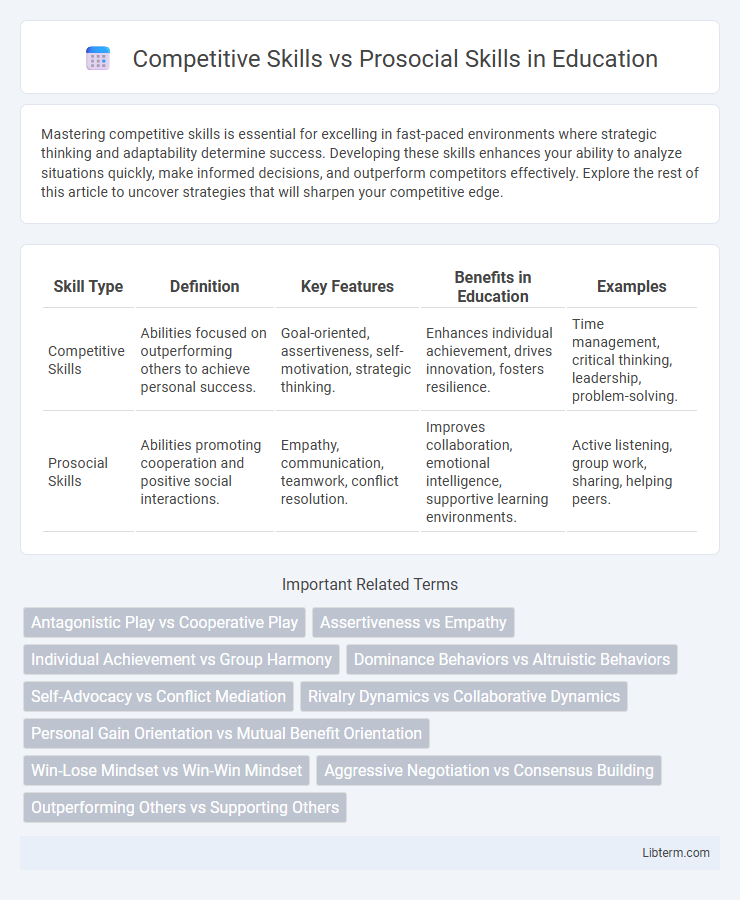Mastering competitive skills is essential for excelling in fast-paced environments where strategic thinking and adaptability determine success. Developing these skills enhances your ability to analyze situations quickly, make informed decisions, and outperform competitors effectively. Explore the rest of this article to uncover strategies that will sharpen your competitive edge.
Table of Comparison
| Skill Type | Definition | Key Features | Benefits in Education | Examples |
|---|---|---|---|---|
| Competitive Skills | Abilities focused on outperforming others to achieve personal success. | Goal-oriented, assertiveness, self-motivation, strategic thinking. | Enhances individual achievement, drives innovation, fosters resilience. | Time management, critical thinking, leadership, problem-solving. |
| Prosocial Skills | Abilities promoting cooperation and positive social interactions. | Empathy, communication, teamwork, conflict resolution. | Improves collaboration, emotional intelligence, supportive learning environments. | Active listening, group work, sharing, helping peers. |
Defining Competitive Skills and Prosocial Skills
Competitive skills emphasize goal-oriented behaviors such as assertiveness, strategic thinking, and resilience to outperform others in various settings. Prosocial skills involve cooperation, empathy, and effective communication aimed at fostering positive social interactions and group harmony. Mastery of competitive skills enables individuals to succeed in competitive environments, while prosocial skills promote collaboration and supportive relationships.
Key Characteristics of Competitive Skills
Competitive skills are characterized by goal-oriented behavior, strong self-motivation, and a relentless drive to outperform peers and exceed performance benchmarks. These skills emphasize strategic thinking, resilience under pressure, and the ability to make quick decisions in high-stakes environments. Mastery of competitive skills often involves adaptability, confidence, and effective communication tailored to assert dominance and secure advantages in professional or social settings.
Core Elements of Prosocial Skills
Prosocial skills center on empathy, cooperation, and effective communication, enabling individuals to build positive relationships and support others' well-being. These core elements contrast with competitive skills, which emphasize assertiveness, goal achievement, and self-promotion. Developing prosocial skills enhances social harmony and emotional intelligence by fostering understanding, trust, and collaboration within groups.
The Role of Competition in Personal Growth
Competition plays a crucial role in personal growth by fostering resilience, strategic thinking, and motivation to achieve goals. Competitive skills such as goal-setting, perseverance, and critical analysis enhance individual performance and drive self-improvement. Developing prosocial skills alongside competition ensures balanced growth, promoting cooperation, empathy, and effective communication in social and professional contexts.
Benefits of Nurturing Prosocial Abilities
Nurturing prosocial skills such as empathy, cooperation, and active listening fosters stronger interpersonal relationships and enhances community well-being. These abilities promote conflict resolution, emotional intelligence, and collaborative problem-solving, leading to more harmonious and productive environments. Developing prosocial skills also supports mental health by reducing stress and increasing social support networks.
Competitive Skills in Academic and Workplace Success
Competitive skills, such as goal orientation, resilience, and strategic thinking, significantly enhance academic and workplace success by driving individuals to outperform peers and achieve measurable results. These skills foster a strong motivation for excellence, enabling effective problem-solving and adaptability in high-pressure environments. Mastery of competitive skills correlates with higher productivity, leadership potential, and the ability to thrive in competitive job markets and rigorous academic settings.
Prosocial Skills for Teamwork and Collaboration
Prosocial skills, including empathy, active listening, and effective communication, are essential for fostering teamwork and collaboration by promoting trust and mutual respect among team members. These skills enhance group cohesion and enable constructive conflict resolution, which improves overall group performance and productivity. Emphasizing prosocial behaviors helps create a supportive work environment where diverse ideas are valued, driving innovation and successful collective outcomes.
Balancing Competition and Cooperation
Balancing competition and cooperation requires integrating competitive skills such as strategic thinking and goal orientation with prosocial skills like empathy and effective communication. Developing this balance enhances team dynamics, fosters mutual respect, and drives collective success in both workplace and social environments. Mastering the interplay between assertiveness and collaboration leads to sustainable performance and positive interpersonal relationships.
Developing Both Skill Sets in Education
Developing both competitive skills and prosocial skills in education fosters well-rounded students capable of thriving in diverse environments. Competitive skills, such as goal-setting and resilience, promote personal achievement and drive, while prosocial skills like empathy and cooperation enhance teamwork and social harmony. Integrating curricula that balance individual challenges with collaborative activities creates learners equipped for success in both competitive and communal contexts.
Strategies for Integrating Competitive and Prosocial Skills
Effective strategies for integrating competitive and prosocial skills involve fostering environments that balance individual achievement with cooperative behavior, such as incorporating team-based goals alongside personal performance metrics. Implementing structured activities that encourage both healthy competition and mutual support, like peer mentoring paired with skill-building contests, can enhance social dynamics and personal growth. Emphasizing empathy training and conflict resolution within competitive contexts promotes respect and collaboration, ensuring that competitiveness does not undermine prosocial development.
Competitive Skills Infographic

 libterm.com
libterm.com